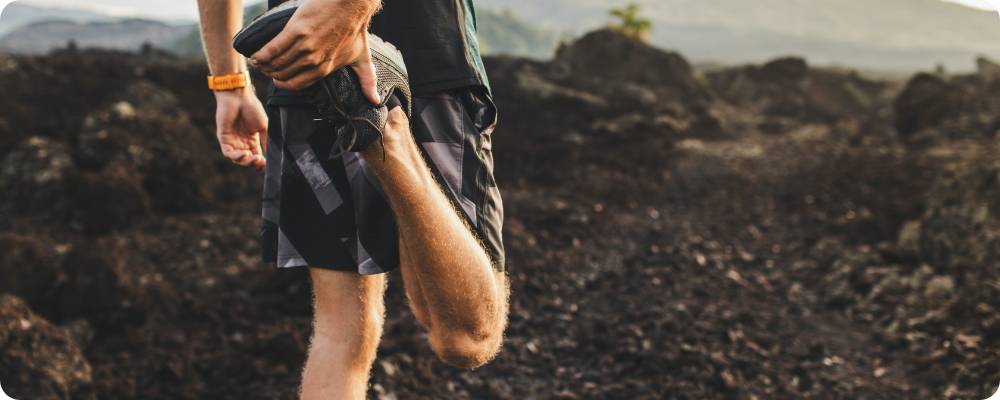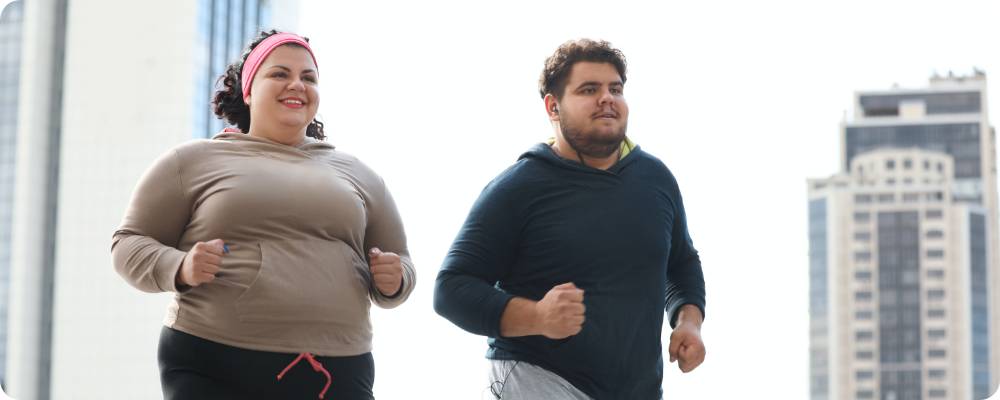What are good shoes for heavy runners?
Choosing the right pair of running shoes can improve your performance and reduce the risk of injury. To make your choice, you need to consider various criteria: those related to your running habits as well as your personal characteristics.
The criteria related to your running include the terrain you run on, the distance covered, and the type and frequency of your training sessions each week.
Personal characteristics criteria include your gender, foot shape, stride type, and also your weight.
Heavy runners should pay particular attention to this criterion when choosing their shoes. Indeed, these shoes need to have additional reinforcement and cushioning to minimize the impact on the runner's joints and tendons.
In this article, we will cover various topics such as the influence of weight in running, shoes with carbon plates, and examples of suitable shoes for heavy runners. But first, let's define what is a heavy runner.
What is considered a heavy runner?
A heavy runner is considered to be a runner who weighs more than 90 kg. Although this figure may seem arbitrary, as some experienced runners in excellent physical shape can be considered as such.
However, in both cases, this profile of runner will need a more cushioned and stable shoe than a lighter runner.
Besides the "weight" factor, we remind you that when choosing a running shoe, you should take into account:
- The runner's athletic profile: speed/race times, experience
- The type of terrain you run on: asphalt, trails, rocky terrain, mountain
- Your athletic goal: starting to run, training, competition, running a first marathon, improving your race times
- Type of shoe: for training, competition, mixed
- Runner's profile: type of stride and weight.
How does weight influence running?
During running, the joints must support up to twice the body's weight with each step, which amplifies stress on the knees, hips, and ankles.
For overweight runners, this additional impact heightens the importance of wearing appropriate footwear to mitigate strain and reduce injury risk.
Beyond choosing a single pair of supportive shoes, rotating between multiple pairs tailored to different surfaces—such as cushioned road shoes for asphalt and grippy trail shoes for uneven terrain—offers even greater benefits.
This strategy does not only enhance comfort and durability, but it also gives midsoles time to recover, preserving their shock-absorbing properties.
So, you may wonder “how many running shoes should I have?” Experts recommend at least two pairs of shoes, especially for runners managing additional weight. This proactive approach optimizes joint protection and overall performance.
Are carbon plate shoes suitable for heavy runners?
Shoes with this technology are aimed at performance and are directed at runners with good running technique and high racing speeds. These sports shoes are usually lighter than traditional models, and their durability is also lower. That's why they are recommended for runners weighing less than 75 kg.

Running shoes for people over 90 kg
Running shoes for those over 90 kg need advanced cushioning to manage the higher impact forces experienced with each step. However, while cushioning protects joints by absorbing shock, excessive cushioning can reduce energy efficiency, affecting speed and stability.
So, are cushioned shoes good or bad? The answer depends on the runner's needs and running habits.Heavy runners benefit most from well-designed cushioning that balances protection and responsiveness, ensuring durability and performance without compromising control.
- The Hoka Bondi is synonymous with comfort and cushioning and is designed for runners with a neutral gait and for all distances.
- The New Balance 1080 provides a smooth stride and excellent cushioning both in training and races from 10 km to the marathon. Although it is a cushioned shoe, it also allows for good dynamism.
- Adidas Ultraboost, this running shoe, has everything you need to enjoy your races safely and comfortably at any distance. Its Boost technology ensures reactive cushioning, while the Linear Energy Push system provides stability.
- The Asics Nimbus is undoubtedly the most comfortable model of the Japanese brand. This running shoe is ideal for your daily training as well as your races at all distances, up to the marathon.
- Brooks Glycerin: this sports shoe offers maximum cushioning and smooth transitions. A model that stands out in long-distance asphalt races.
- Nike Vomero combines ZoomX foam with a Zoom Air unit in the forefoot, ensuring a cushioned and reactive stride. A model that stands out in long-distance asphalt and trail races.
- The Mizuno Wave Rider is aimed at runners weighing up to 85 kg. The Wave plate and Mizuno Enerzy technology ensure excellent stability and reactive cushioning both in training and competition. Suitable for all distances.
What Trail Shoe for a Heavy Runner?
Once again, it all depends on the distance, the type of terrain you run on and its technicality, as well as your athletic profile. However, generally, we could recommend the Hoka brand known for its great comfort and cushioning, and its most popular model, Hoka Speedgoat, will meet your needs. The Asics Gel-Trabuco, the Brooks Cascadia, just to mention a couple, are excellent options.

What is a good running shoes for an overweight woman
The needs of overweight runners, regardless of gender, are identical. Both men and women face the same physiological challenges, such as increased strain on joints and muscles. Choosing the right footwear is essential to minimize impact, enhance comfort, and reduce the risk of injuries.
Key characteristics of suitable running shoes for overweight women include:
- Shock absorption: Cushioned soles reduce stress on knees and ankles.
- Durable materials: Reinforced construction ensures longevity, even under added pressure.
- Enhanced support: Stabilizes foot posture to prevent discomfort and improve balance.
- Wide-fit designs: Accommodates broader feet for a secure and comfortable fit.
- Optimal comfort: Promotes motivation and consistency in training.
Selecting the right running shoes transforms the experience, offering stability, protection, and confidence with every step. Proper footwear ensures smoother, more enjoyable movement and safeguards the body during every workout.
We have carefully selected the best running shoes designed to meet the needs of overweight women. These models combine advanced cushioning, durable materials, and optimal support to ensure comfort and protection during every run.
Explore these top picks to find the perfect fit for your goals and preferences.
Best marathon shoes for heavy runners
Running a marathon demands not only physical endurance but also footwear that supports the body over long distances.
For heavy runners, this effort is even more challenging due to the increased impact on joints and muscles.
The longer the race, the greater the risk of injury, making the choice of shoes crucial.
You need shoes with solid cushioning to absorb shock throughout the entire marathon.
However, while cushioning is essential, it’s also important that the shoes don’t become too bulky, as excessive cushioning can affect stability and energy efficiency.
Focus on shoes that offer a balance of cushioning and stability, with lightweight materials to reduce fatigue as you progress through the race.
Your marathon shoes should also match your unique foot shape and running style. Choose a pair that offers a comfortable fit and supports your stride, ensuring you can maintain proper form without discomfort.
Durable construction is essential to ensure reliable performance, from training sessions to the final miles of race day.
Selecting the right shoes for a marathon will enhance your performance and reduce the risk of injury.
Best trail running shoes for heavy runners
Trail running requires shoes that handle uneven terrain while offering exceptional comfort and protection. For heavy runners, prioritize models with reinforced soles and aggressive tread patterns to enhance grip and stability on rugged paths.
Look for designs with superior shock absorption to reduce impact on joints during descents or going downhill. Waterproof or water-resistant materials keep feet dry in challenging conditions, while a secure fit prevents slipping.
A well-cushioned and durable trail running shoe ensures confidence and comfort on every adventure.
Shoes for walking with overweight
For walking, you don't need a top-of-the-range shoe. You can choose a model adapted to your weight that provides good stability and cushioning.
Best running shoes for heavy runners on I Run
Feedback from different people often varies, but the key is to prioritize shoes that feel good, offer comfort, and provide proper support and fit. Avoid focusing on aesthetic or trendy choices and instead opt for functionality.
The shoes you choose should align with your running goals and style—whether track running, competition, or casual jogging—while addressing your biomechanical needs.
Test various models and brands to find what works best for you during movement.
Running shoes should help you reach your objectives, make running enjoyable, and not turn it into a struggle.
Choose footwear that enhances your experience instead of forcing you to adapt.
Find the best running shoes for heavy runners on i-Run and take your running to the next level.
DISCOVER ALL OUR RUNNING PRODUCT
YOU MIGHT ALSO LIKE...
How to take care of your running shoes?
Receiving a new pair of running shoes is always exciting. Since buying good running shoes can be expensive, proper care is necessary to avoid premature replacement and better for the environment.
Through this article, and with our expert tips, you can maintain your running shoes for as long as possible, keeping them clean and comfortable.
Running should be fun. To keep it that way, we've compiled 6 basic rules that show what's important for feeling good in sports and for optimal recovery/preparation.
To integrate running training into your routine, you should listen to your body, respect it, and start with a rhythm that is tailored to you.
How to start running if you are overweight?
Running is an activity accessible to everyone. Often taken up to quit smoking, lose weight, or simply get back in shape, running, even for those already in good health, can be a challenge.
For those who are overweight, the idea of taking up running may seem complicated, or even impossible. By following simple advice, it's possible to improve your condition, physical fitness, and endurance.




